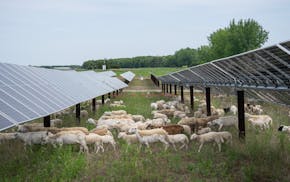Hormel Foods achieved a rare accomplishment in today's turkey industry recently: growth.
Sales of the company's Jennie-O ground turkey rose, and the brand reached more shoppers this spring even as the market for the protein has faced long-term decline.
"You think about what's happening in the world of protein, and our turkey portfolio is so on-trend," said Hormel CEO Jim Snee. "We're meeting the customer where they are, and our supply chain is able to meet this incredible demand."
Other turkey companies are not so upbeat. Overall, the industry faces declining consumer demand, and many major players are pulling back from the poultry.
Butterball closed an Arkansas turkey plant in February, and Foster Farms shut a turkey facility in California a few weeks ago. Cargill is closing a massive turkey plant in Arkansas in August.
Minnetonka-based Cargill even had to bat down a rumor that the company was leaving the turkey industry because of tight profits and declining demand.
"Turkey remains a part of Cargill's protein portfolio," the company said in a statement this month, pointing out its remaining turkey-processing facilities in California, Missouri and Virginia.
Jennie-O did some downsizing in the past several years by consolidating plants in Willmar, Minn., and shifting production at a Wisconsin facility.
The remaining Willmar plant will undergo a $30 million upgrade.
"We set out to make sure we have a demand-driven business, not a supply-driven one," Snee said. "Structurally, what's happening in the industry is working really well for us."
It helps that the worst of the bird flu outbreak appears to be in remission more than three years after it began. The viral infection struck two commercial turkey operations in Minnesota in January but has not surfaced in the state's turkey farms since. Minnesota is the nation's leading turkey producer.
Another virus is plaguing turkey growers, however. Avian metapneumovirus (aMPV) has been hitting turkey barns, including Jennie-O growers, wiping out millions of birds in the past year.
"When it does happen, we know we can navigate it, as we've done before," Snee said.
Asked about the big turkey holiday of Thanksgiving less than six months away, he demurred.
"Whole turkeys are not at all strategic for us. They are a component of the portfolio," Snee said.
"The most important work we're doing is on value-added, making sure we can drive the ground turkey business in retail and foodservice. That's what this category is all about."
Jennie-O faces an uphill battle, with chicken conquering many plates. Per capita turkey consumption declined through the past five years after remaining fairly steady for much of the 21st century, according to federal data. Last year's 13.8 pounds consumed per American was the lowest level in nearly 40 years.
John Ghingo, Hormel's head of retail, said the Jennie-O brand stands above competitors and store-brand turkey offerings because of a "long history of attracting consumers to the category."
"There's good momentum and consumer demand around the value of ground turkey, which offers versatility," Ghingo said. "And the lean protein part of the story is super important."
Hormel expects to finish the year stronger than it started, with continued turkey growth and a major rebound in the Planters nut business, which suffered from a plant closure last fall.
The company is ramping up advertising while continuing to reap benefits from a three-year "transform and modernize" initiative.
"I'm in that reflective mode as I near my retirement, and what's so rewarding is to see our team able to finally capitalize on all the great work we've done," Snee said.
The Austin, Minn.-based food company reported second-quarter profits of $179.7 million on $2.9 billion in sales on Thursday, in line with analyst expectations. Hormel lowered the high end of its earnings guidance for the year and saw its stock price tick up about 1% to close at $30.38 on Thursday.
Northern Minnesota worried recent dip in Canadian visitors portends slow summer
Uncertainty persists for Minnesota farmers, businesses as courts toggle tariffs

Medtronic ups return-to-office policy for hybrid workers to four days a week

Xcel lets loose a small army of hungry sheep to keep its solar farm in order
![Frozen Jennie-O turkeys photographed at a Cub Foods store in St. Paul, Minn., on Monday, November 15, 2021. ] Elizabeth Flores • liz.flores@startri](https://arc.stimg.co/startribunemedia/U74OMTK3OMVA7SBJ2BTZ5SF4D4.jpg?h=91&w=145&fit=crop&bg=999&crop=faces)